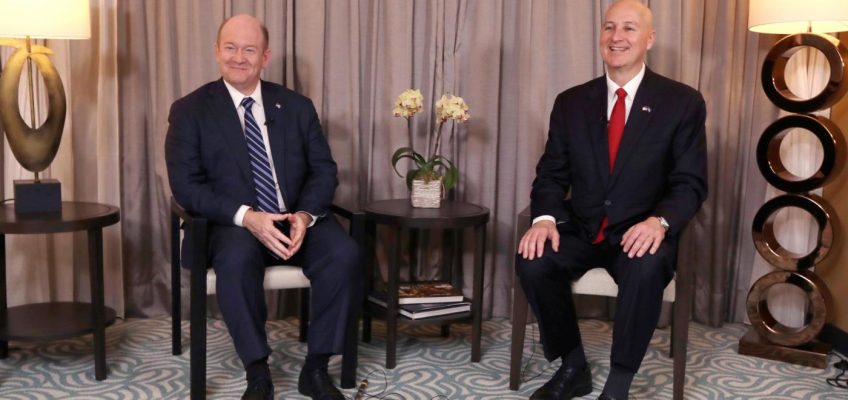By WAFAA SHURAFA and FATMA KHALED
DEIR AL-BALAH, Gaza Strip (AP) — Israeli airstrikes across Gaza killed at least 25 people on Friday including children, hospital workers said, as the new U.S. ambassador to Israel made his first public appearance in Jerusalem.
Related Articles
US lawmakers’ bipartisan Taiwan visit signals support despite harsh words and tariffs from Trump
Venice expands its day-tripper tax program in bid to combat overtourism
Iran-US talks over Tehran’s nuclear program hinge on a billionaire and a seasoned diplomat
US strikes on a Yemeni oil port kill 74 people, Houthis say, in deadliest attack of Trump campaign
Rubio says the US will drop Ukraine-Russia peace efforts if no progress within days
The dead included 15 people killed in three strikes on the southern city of Khan Younis, according to Nasser Hospital, which received the bodies. Ten people were killed in Jabaliya, including eight from the same home, according to the Indonesian Hospital, where the bodies were brought.
The strikes came a day after more than two dozen people died in Gaza as Israel continued attacks, pressuring Hamas to return the hostages and disarm.
U.S. Ambassador Mike Huckabee visited the Western Wall on Friday, the holiest Jewish prayer site in Jerusalem’s Old City. He inserted a prayer into the wall, which he said was handwritten by U.S. President Donald Trump. “Those are his initials, D.T.,“ said Huckabee while showing the note to the media.
In his first act as ambassador, Huckabee said Trump told him to pray for the peace of Jerusalem. Huckabee also said every effort was being made to bring home the remaining hostages held by Hamas. A one-time presidential hopeful, Huckabee has acknowledged his past support for Israel’s right to annex the West Bank and incorporate its Palestinian population into Israel but said it would not be his “prerogative” to carry out that policy.
During his first term, Trump recognized Jerusalem as Israel’s capital over Palestinian objections and moved the U.S. embassy from Tel Aviv. Palestinians seek the eastern part of the city, captured by Israel in the 1967 Mideast war, as their future capital.
Huckabee’s arrival comes at a pivotal time in the 18-month war, as international mediators including the U.S. are trying to get a broken ceasefire back on track.
Israel is demanding that Hamas release more hostages at the start of any new ceasefire and ultimately agree to disarm and leave the territory. Israel has said it plans to occupy large “security zones” inside Gaza.
Khalil al-Hayya, head of Hamas’ negotiating delegation, said Thursday the group had rejected Israel’s latest proposal along those lines. He reiterated Hamas’ stance that it will return hostages only in exchange for the release of more Palestinian prisoners, a full Israeli withdrawal from Gaza and a lasting truce, as called for in the now-defunct ceasefire agreement reached in January.
Hamas currently holds 59 hostages, 24 of whom are believed to be alive.
Friday’s airstrikes came a day after aid groups raised alarm over Israel’s blockade of of Gaza, where it has barred entry of all food and other goods for more than six weeks. Thousands of children have become malnourished, and most people are barely eating one meal a day as stocks dwindle, the United Nations said.
Israel’s Defense Minister says the blockade is one of the “central pressure tactics” against Hamas, which Israel accuses of siphoning off aid to maintain its rule. Aid workers deny there is significant diversion of aid, saying the U.N. closely monitors distribution. Rights groups have called it a “starvation tactic.”
The war began when Hamas-led terrorists attacked southern Israel on Oct. 7, 2023, killing about 1,200 people, mostly civilians, and abducting 251. Hamas has been designated a terrorist organization by the United States, Canada, and European Union.
Most of the hostages have since been released in ceasefire agreements or other deals.
Israel’s offensive has since killed over 51,000 Palestinians, mostly women and children, according to Gaza’s Health Ministry, which does not distinguish between civilians and combatanFts. The war has destroyed vast parts of Gaza and most of its food production capabilities. The war has displaced around 90% of the population, with hundreds of thousands of people living in tent camps and bombed-out buildings.
Khaled reported from Cairo. Associated Press writer Sam Mednick in Tel Aviv, Israel, contributed to this report.
Follow AP’s war coverage at https://apnews.com/hub/israel-hamas-war




